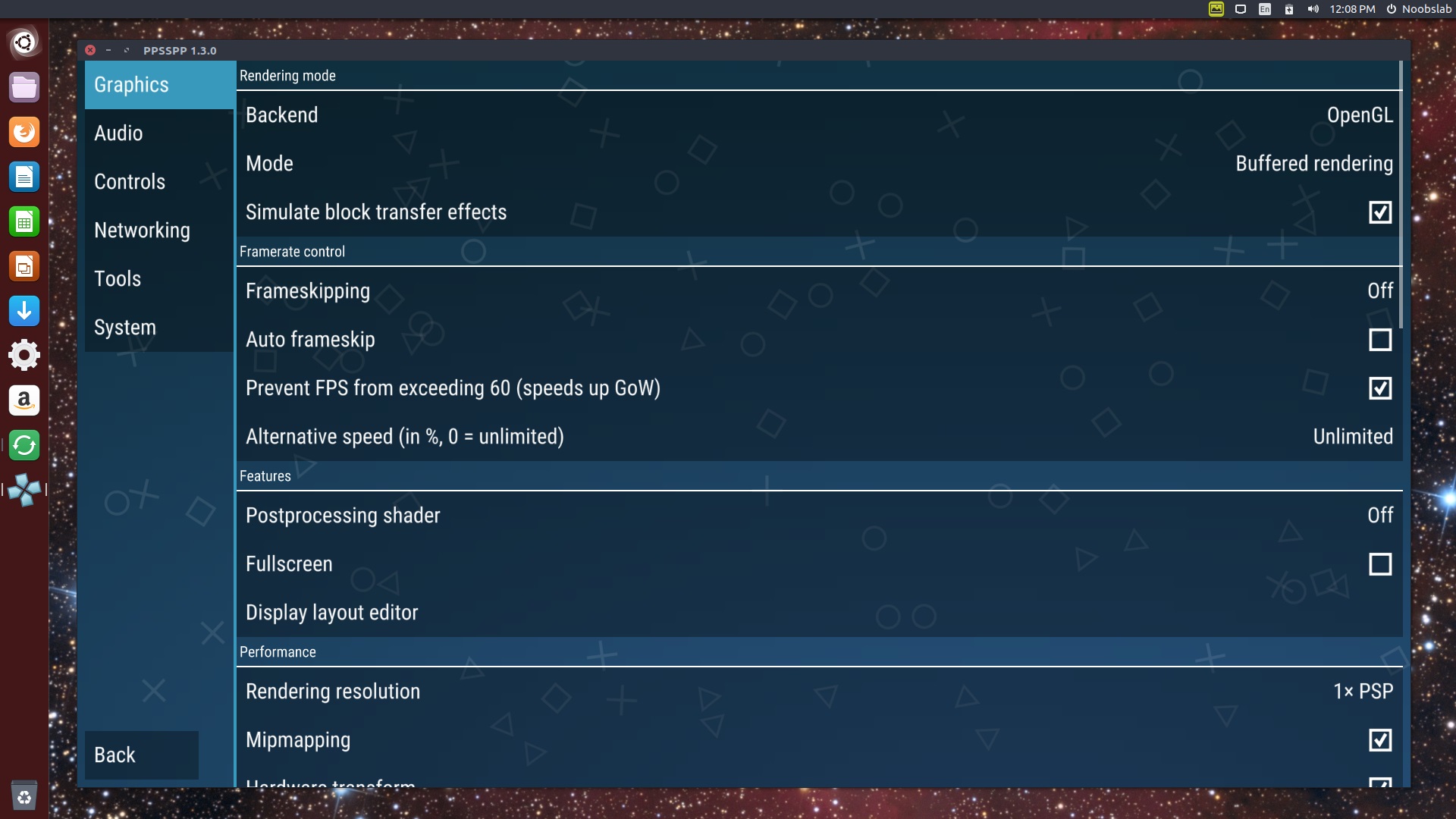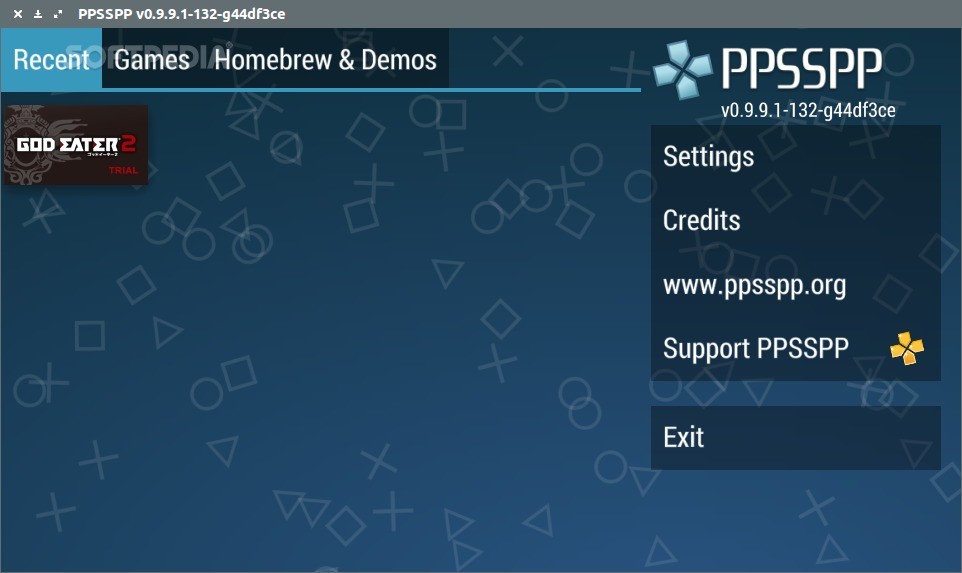Ppsspp For Linux
| Table of Contents |
|---|
| Download the source code |
| Prerequisites |
| Building for Windows |
| Building for Android |
| Building for Qt platforms |
| CMake (Other platforms) |
| Building for iOS |
| Building for Raspbian |
| Building For Linux (Clang 3.4) |
- Psp For Linux
- Ppsspp For Kali Linux
- Ppsspp Linux Deb
- Ppsspp For Linux Mint
- Ppsspp For Linux Ubuntu
- Ppsspp Linux Save Location
Download the source code
Aug 29, 2018 To remove PPSSPP, run command in terminal: sudo apt-get remove -autoremove ppsspp ppsspp-. In addition, for those who care about the versioning issue, I’ve re-uploaded PPSSPP 1.6.3 (based on RetroGames PPA package) into my personal PPA for Ubuntu 18.04 with the issue fixed. Apr 18, 2018 Those looking to play your favorite Sony PSP games on the Linux platform need to try out PPSSPP. It’s a Sony PSP emulator written in C. The emulator works very well on nearly any Linux distribution. Apr 03, 2017 PPSSPP, a free and open-source Sony PSP emulator, has reached the 1.4 release a few days ago. Here’s how to install it in Ubuntu 14.04, Ubuntu 16.04, Ubuntu 16.10, and Ubuntu 17.04.
System info says that the cfw is 6.20 Pro-B9. Gta 5 ppsspp iso.

(for additional information that's partially outdated, see the development page)
Install git and check out the source code (git clone --recurse-submodules https://github.com/hrydgard/ppsspp.git, or fork and clone that).
After doing an update, or if you forgot --recurse-submodules, run this command:
in order to update the translations (lang), FFmpeg libraries, and other submodules.
Recommended way to get up-to-date is (git pull --rebase https://github.com/hrydgard/ppsspp.git) and then the above command.
If you choose to build from tarballs of the source code instead of cloning the full git repository, you will need to manually download the tarball releases of each of the submodules as well (submodules are listed in this repo's .gitmodules file).
Prerequisites
First, install Python 3.
Supported Platforms
- Windows :: Microsoft Visual Studio 2015 Community Edition or higher. NOTE: It is necessary to install the Visual Studio component 'Windows XP support for C++', can be found under 'Individual Components' to the right in the Visual Studio installer.
- Linux :: clang/gcc/g++. Debian/Ubuntu uses the
build-essentialpackage. Fedora/RHEL uses the 'Development Tools' package group. Install:sudo apt install build-essential cmake libgl1-mesa-dev libsdl2-dev libvulkan-dev - Mac OS X :: Xcode Command Line Tools. You will also need Homebrew installed with the
sdl2,cmake,libzipandsnappypackages (brew install sdl2 cmake libzip snappy). - Android :: You should have the latest Android Studio installed. From the SDK manager within, install CMake and NDK.
- Raspbian :: It seems to be required to compile SDL2 manually, the package doesn't work. See the CMake instructions and Raspberry Pi specific instructions.
- iOS :: OS X 10.10+ with Xcode 6+ installed. If compiling a fakesigned binary intended for jailbroken iOS, you also need iOSOpenDev installed with a patched iPhoneOS SDK (
sudo iod-setup sdk)
Compilers --- you will need one of the following (if you follow the above, you probably have them): Gta 3 iso file for ppsspp pc.
- Clang :: Minimum version of 3.4 is required. Clang is preferred over GCC.
- GCC :: Minimum version of 4.8 is required.
- MSVC :: Minimum version of MSVC 2015 is required, 2017 updated to latest is recommended.

CMake (minimum version of 3.6) is also required if not building on Windows (and you have it if you follow the above Android instructions).
Building for Windows
Open the solution and just build, it'll work. You may just needto set up a path or two to the Windows SDK (which includes the DX SDK)nowadays. A step-by-step compiling guide can be found here.
Building for Android with Android Studio
Open the PPSSPP folder as a project in Android Studio. Change the build variant to 'normalOptimized' and build and run. Everything should work, provided you have installed the NDK and CMake properly through the SDK manager.
Psp For Linux
Building for Qt platforms
The Qt frontend currently supports Linux and any other platform that hasQt available (though not officially, apart from Linux). We use CMake to build for Qt.
A Qt-based frontend is available in the Qt/ dir.
Ppsspp For Kali Linux
For building the package via command-line, you will need toensure Qt5 is installed for your target platform(on Linux: Development libraries are qt5-qmake qtsystems5-dev qtmultimedia5-dev qttools5-dev-tools for Qt5. Install SDL 1.2 if you want to use USB Gamepad or improve Linux audio. For Qt's built-in audio, use qtmultimedia5-dev on Qt5.). After installing these package components, simply open up the terminal and:
On Mac, you can use brew to install the required dependencies:
Then build using (this is new):
For all platforms, the application is automatically packaged in to an installable file (.app for iOS and Mac OSX, .exe for Windows and a standalone binary on Linux).
CMake (Other platforms)
For Ubuntu (and possibly other distros) make sure to runsudo apt install libgl1-mesa-dev libsdl2-dev.
PPSSPP currently uses CMake on platforms that do not have Qt installedand wish to target SDL or native (iOS/Android/Blackberry) frontends.In order to build for most systems, create a build directory and run:
or:
You can specify the -G parameter to cmake to choose a generator.The NMake Makefiles, Visual Studio 11 (projects + sln),GNU Makefiles and Unix Makefiles generators have been tested.
Alternatively, run b.sh, on Linux, which will create the directory for you.If you are on Windows, you will need GNU and CMake to run the bash scripts.
Building for iOS (mariolopjr's method)
From https://github.com/hrydgard/ppsspp/issues/11905:
- Follow PPSSPP cloning instructions
- Download Xcode 9.4.1 from https://developer.apple.com/download/more/, extract from .xip file, rename to Xcode-9.4.1, and copy to Applications
- Run the following command (instead of the one from the wiki):
cmake -DCMAKE_TOOLCHAIN_FILE=./cmake/Toolchains/ios.cmake -DIOS_PLATFORM=OS -DCMAKE_IOS_SDK_ROOT=/Applications/Xcode-9.4.1.app/Contents/Developer/Platforms/iPhoneOS.platform/Developer/SDKs/iPhoneOS11.4.sdk -H. -Bbuild.ios -GXcode - Navigate to build.ios, open PPSSPP.xcodeproj in Xcode-9.4.1, set the signing stuff, and then build the app
- Install the .app as necessary, or navigate to the built .app, create Payload folder and move .app into it, and create an ipa using the following command
zip -r9 PPSSPP.ipa Payload/PPSSPP.app, and use Cydia Impactor to install.
You should have an updated PPSSPP version, built on iOS 11 SDK (that should help with crashes)!
Building for iOS (CMake)
Run the script:
Then open the generated project in Xcode using:open *.xcodeprojOr use the command line:xcodebuild -configuration Release
Alternate method which seems to work better:
For running in simulator: cmake -DCMAKE_TOOLCHAIN_FILE=./cmake/Toolchains/ios.cmake -DIOS_PLATFORM=SIMULATOR -H. -Bbuild.ios -GXcode
Then go to the target, and set developer profile as iOS developer. Go to the General tab of the target and check the box to automatically manage signing. After that, things should work.
The PPSSPP.app bundle will be in /path/to/ppsspp/build-ios/Release-iphoneos/PPSSPP.app. You may then scp or afc it to /Applications/ and launch PPSSPP.
If this is your first time installing PPSSPP to your iOS device, you may need to run uicache as mobile in a terminal session to rebuild the SpringBoard UICache, or simply reboot.
See https://github.com/hrydgard/ppsspp/issues/5441 and https://github.com/hrydgard/ppsspp/issues/7880 for some troubleshooting information.
Building for Raspbian
GCC is preinstalled, but you can use sudo update-alternatives --config cc and sudo update-alternatives --config c++ to switch to Clang.
Ppsspp Linux Deb
Make sure to include -DCMAKE_TOOLCHAIN_FILE=cmake/Toolchains/raspberry.armv7.cmake when using cmake. For armv6 devices, you'll need to use -DCMAKE_TOOLCHAIN_FILE=cmake/Toolchains/raspberry.armv6.cmake. See also ./b.sh --rpi.
Note that echo 5 sudo tee /sys/devices/system/cpu/cpufreq/ondemand/up_threshold will improve performance but increase temperatures. You may always want the legacy GL driver and to update firmware, as well as allocate more RAM to the GPU.
If you're using a windowing environment, remember to exit it (i.e. Ctrl-Alt-F1, Ctrl-Alt-F7 to get back) when starting PPSSPPSDL.
See https://github.com/hrydgard/ppsspp/issues/7479 for more information.
Building For Linux (Clang 3.4)
Ppsspp For Linux Mint
In order to build it under Clang environment, you will need clang-3.4 packages from the repository and install it. Then, you will need to run the command to locate where is bits/c++config.h:
Usually, the c++config.h located at /usr/include/<arch>/c++/<version>/bits depending kinds of machine and installation. After located the c++config.h and other header file components, simply copy the c++config.h and other header files to /usr/include/c++/<version>/bits and placed it into the location in order to make Clang building the project without problems.
Ppsspp For Linux Ubuntu
Clang works perfectly with Cmake build method, so you might need to do something before building it is run the command to set the Clang as the working compiler before building it via Cmake method:
Ppsspp Linux Save Location
You can also put these command into .bashrc file to make it as a default compiler.